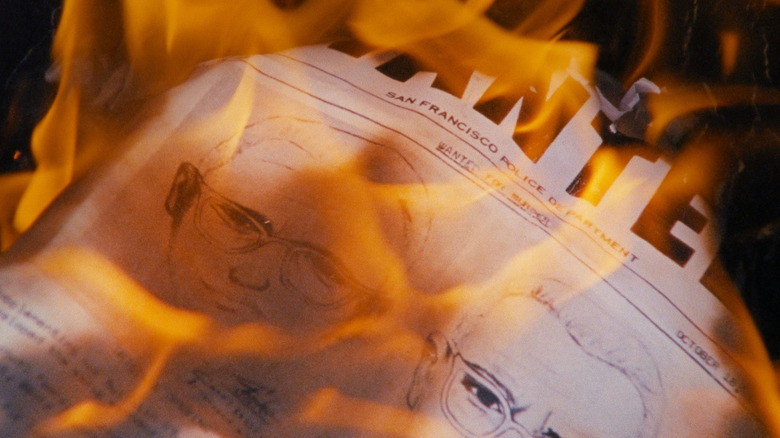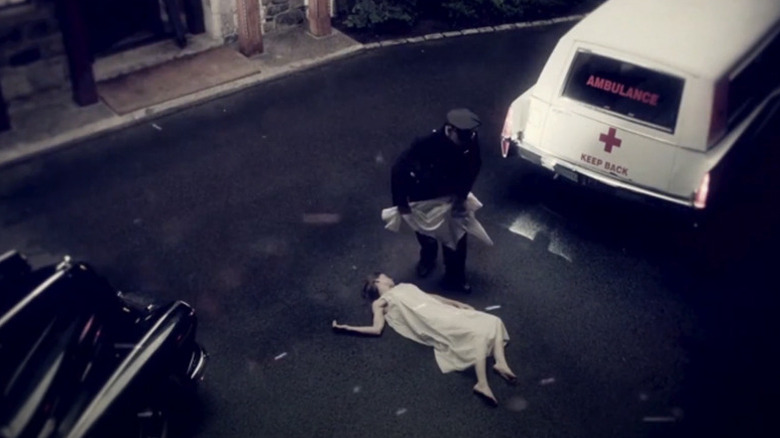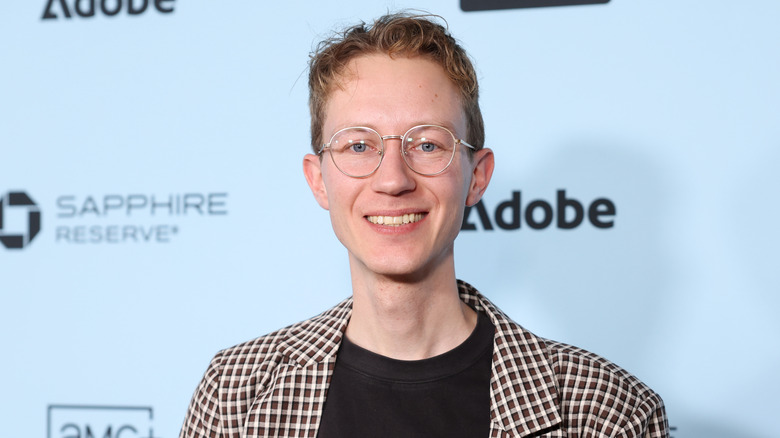An Unconventional New True Crime Doc Pokes Fun At The Genre's Most Familiar Tropes
We may receive a commission on purchases made from links.
"Zodiac Killer Project," a new movie from director Charlie Shackleton that debuted at the 2025 Sundance Film Festival, is one of the most unconventional true crime documentaries ever made. It begins with a slow pan across a rest stop parking lot, with a narrator's voice telling the audience what we would be seeing if the filmmaker had been able to make the movie he wanted to make. Most of the film plays out this way — we witness establishing shots of banal locations, with narration explaining why they would have been important in a version of this story that we'll never actually see, and the occasional flash of an insert shot showcasing the action that would have taken place. It may sound boring, but against all odds, it's mesmerizing.
Shackleton wanted to adapt former police officer Lyndon Lafferty's 2012 book "The Zodiac Killer Cover-Up: The Silenced Badge," which purported to detail Lafferty's years-long investigation that allegedly determined the true identity of the Zodiac Killer before, the author claims, a shadowy cover-up forced him to drop the case. But after Shackleton secured the book rights and began pre-production on the movie, the deal somehow fell apart, seemingly leaving the director with nothing. However, in a cinematic example of turning lemons into lemonade, he realized that because there were records of many of Lafferty's claims in things like publicly accessible interviews and police reports, Shackleton didn't actually need the rights to the book to tell the story after all (most of it, anyway). So "Zodiac Killer Project" is simultaneously a eulogy for a film that will never exist and an unusual vehicle for presenting much of the same information that version would have contained.
Zodiac Killer Project has a love/hate relationship with true crime documentaries
As a modern documentary filmmaker, Shackleton says true crime has a powerful "gravitational pull" that "eventually, you just give in to." When he discovered Lafferty's story, he got excited about making his own entry in a genre that's become rigidly formulaic, and in this movie, he alternates between enthusiastically describing the tropes he would have embraced and rolling his eyes at the ones he would have avoided. By briefly showing side-by-side clips of popular true crime docs that all have the same style of opening credits, or that use grainy old footage of children playing in the yard as a way to indicate a simpler time in American life, he draws attention to the filmic language that's crystallized in this genre. "It's like there's no direction required," he says, and while he's mostly joking, there are so many of these connections made that it does seem as if one could almost drag and drop footage into a ready-made template that hits all the familiar beats.
Some of these observations verge on being a little too self-satisfied for their own good, but they never feel mean-spirited (and maybe the power of Shackleton's British accent just made it easier to listen to than it would have been otherwise). He admits he would have relied on "evocative B-roll" and would probably have even fudged the truth in some instances through implication and editing in favor of creating a more heightened dramatic moment, like so many of these projects do. He gets slightly more pointed, however, with criticisms of the ethics of decisions made in projects like "The Jinx," "Making a Murderer," and the "Paradise Lost" documentaries, and he specifically dunks on Ryan Murphy's Jeffrey Dahmer Netflix show for claiming to center the victims after spending the majority of its episodes reveling in the killer's violent acts.
Despite its limiting premise, Zodiac Killer Project is still effective
Perhaps the most interesting thing about the movie is that even though its structure and style means that it basically has one arm tied behind its back, it still manages to be effective throughout. You never get the sense that something heinous will happen while watching the film's many establishing shots of nondescript California locations, but the emptiness and mundanity of these shots encourages you to think about how places like these could take on an entirely different feeling if a serial killer was wandering through them. Most shots feature slow zooms into the center of the frame, followed by a lengthy period of holding on the zoomed-in shot, and then a slow zoom out back to the initial angle; there is absolutely nothing flashy about the filmmaking in these moments (it's using some of the most basic techniques possible), but paired with the largely compelling narration, the emptiness of these shots encourages you to fill in the events in your mind, unlocking a second plane on which the movie operates.
And I won't spoil the details of the film's centerpiece sequence involving a fishbowl, but simply through narration and a few inserts of recreation footage, the movie is able to create a tense "oh, s***" moment that may have singlehandedly justified "Zodiac Killer Project" being a movie instead of a podcast.
Speaking of podcasts, you can hear me and a couple of other /Film editors talk a little about this movie and more Sundance 2025 documentaries on today's episode of the /Film Daily podcast below:
As of this writing, "Zodiac Killer Project" does not yet have distribution.


